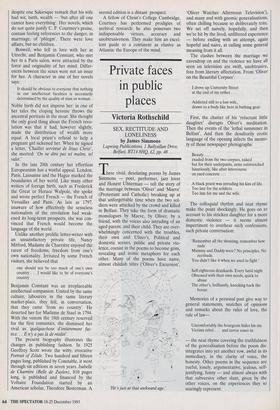Private faces in public places
Victoria Rothschild
SEX, RECTITUDE AND LONELINESS by James Simmons Lapwing Publications, 1 Ballysillan Drive, Belfast, BT14 8HQ, £2, pp. 48 These vivid, desolating poems by James Simmons — poet, performer, jazz lover and Honest Ulsterman — tell the story of the marriage between 'Oliver' and `Maeve' (Protestant and Catholic) breaking up at that unforgettable time when the two sol- diers were attacked by the crowd and killed in Belfast. They take the form of dramatic monologues by Maeve, by Oliver, by a friend, with the voices also intruding of an aged parent, and their child. They are over- whelmingly concerned with the troubles, their own and Ulster's. Political and domestic scenes, public and private vio- lence, coexist in the poems to become grim, revealing and ironic metaphors for each other. Many of the poems have naive, almost childish titles (`Oliver's Excursion', `He's just at that awkward age.'
`Oliver Watches Afternoon Television'), and many end with gnomic generalisations, often chilling because so deliberately trite. We set off naively, hopefully, and then we're hit by the lived, unfiltered experience — before ending with an attempt, again hopeful and naive, at culling some general meaning from it all.
The clashes between the marriage we eavesdrop on and the violence we have all seen on television are swift, unobtrusive, free from literary affectation. From 'Oliver on the Beautiful Corpses':
I drove up University Street at the end of my tether ...
Addicted still to a lost wife, drawn to a body like hers in bathing gear.
First, the chatter of his 'reluctant little daughter' disrupts Oliver's meditation. Then the events of the 'lethal summmer in Belfast'. And then the desultorily erotic language of the opening infects the memo- ry of those newspaper photographs: Beauty ...
exuded from the two corpses, naked but for their underpants, arms outstretched luxuriously, like after intercourse on yard concrete ...
A black priest was intruding his kiss of life. Too late for the soldiers. Too late for me and the wife.
The colloquial rhythm and neat rhyme make the point shockingly. He goes on to account to his stricken daughter for a more domestic violence — it seems almost impertinent to overhear such confessions, such private conversation: 'Remember all the shouting, remember how rude Mummy and Daddy were? No principles. No rectitude.
You didn't like it when we used to fight.'
Self-righteous drunkards. Every lurid night Obsessed with their own needs, quick to abuse The other's, brilliantly, knocking back the booze.
Memories of a personal past give way to general statements, snatches of opinions and remarks about the rules of love, the rule of law—
Uncomfortably the bourgeois hides his sin. Victims rebel . .. and terror eases in.
— the neat rhyme covering the truthfulness of the generalisation before the poem dis- integrates into yet another row, awful in its immediacy, in the clarity of voice, the honesty. Other poems in the sequence are rueful, lonely, argumentative, jealous, self- justifying, funny — and almost always with that subversive other slant, given by the other voices, on the experiences they so searingly represent.










































































































 Previous page
Previous page